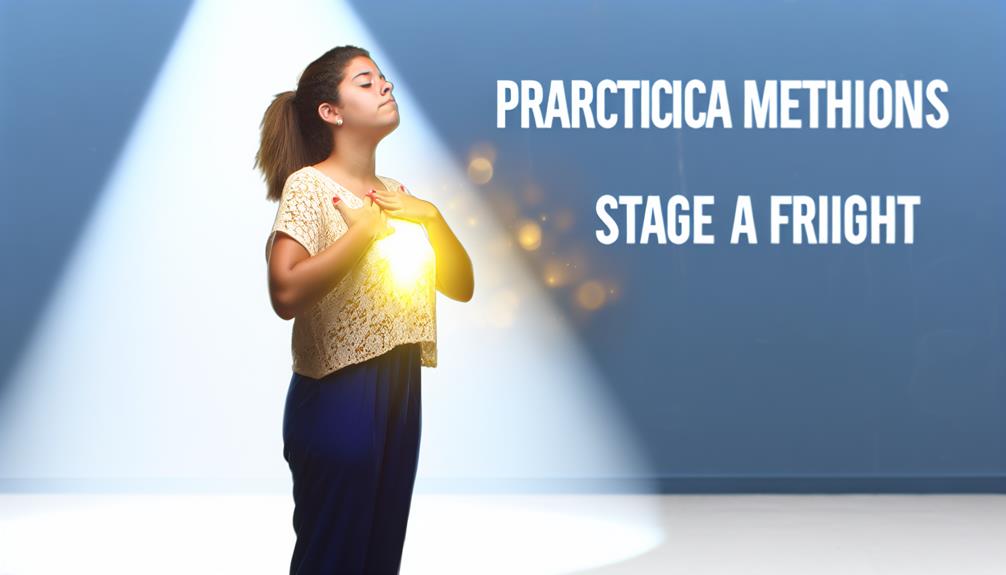Are you tired of feeling anxious and nervous every time you step onto the stage? Do you wish there was a way to overcome your stage fright and deliver a confident performance? Well, look no further.
In this discussion, we will explore the 5 best strategies to help you conquer your stage fright and unleash your true potential as a performer. These strategies are backed by research and have been proven to be effective in helping individuals overcome their fear of performing.
So, if you're ready to take control of your stage fright and shine on stage, keep reading to discover these powerful strategies.
Breathing Techniques for Stage Fright

To overcome stage fright, you can start by practicing diaphragmatic breathing to counteract shallow and rapid breathing. Deep breathing is an effective strategy to calm your nerves and slow down your heart rate. When you're anxious before a performance or public speaking engagement, your body tends to go into fight-or-flight mode, causing shallow breathing. This can further intensify your nervousness and make it difficult to relax. By focusing on deep breathing, you can override this natural response and promote a sense of relaxation.
Deep breathing involves breathing from your belly rather than from your chest. This technique not only helps to calm your mind but also creates a resonant voice, which can enhance your stage presence. It's important to note that modern lifestyle and gadgets often lead to shallow breathing habits, so it's crucial to retrain your body to breathe deeply.
Incorporating relaxation exercises into your daily routine can also be beneficial in managing stage fright. These exercises can include techniques such as progressive muscle relaxation, guided imagery, and meditation. By practicing these strategies regularly, you can train your body to respond more calmly to performance anxiety.
Visualization Exercises for Overcoming Stage Fright
As you continue your journey to conquer stage fright, it's time to explore the power of visualization exercises. Visualizing yourself confidently delivering your presentation in a specific setting can significantly help you overcome stage fright. Imagine the audience's positive reactions, their engagement, and your successful performance. Focus on your strengths and abilities to handle any challenging situation that may arise. Use mental imagery to see yourself embracing imperfections, being natural, and making a genuine connection with the audience.
When visualizing, picture yourself maintaining a confident posture, remaining warm and open, and making comfortable eye contact with the audience. See yourself feeling calm and relaxed as you practice calming techniques such as deep breathing, yoga, and meditation. By visualizing these scenarios, you can mentally prepare yourself for the actual experience of speaking in public.
Visualization exercises can be particularly beneficial for individuals with stage fright or performance anxiety disorder. By visualizing successful outcomes, you're training your mind to focus on positive thoughts and emotions, reducing anxiety and boosting confidence. These exercises create a sense of familiarity with the stage, making the actual performance feel less intimidating.
Incorporating visualization exercises into your preparation routine can help you overcome stage fright and deliver a memorable and impactful performance. Remember to be consistent and practice these exercises regularly to reap the full benefits they offer.
Cognitive Strategies to Manage Stage Fright

Reframe negative thoughts and images to effectively manage fear and anxiety associated with stage fright. Cognitive strategies can help you overcome stage fright and manage your fear of public speaking.
One effective strategy is to replace scary thoughts with calming and reassuring thoughts and images. Instead of dwelling on thoughts of failure or embarrassment, focus on positive outcomes and success. Practice positive self-talk by reframing negative internal dialogue into positive affirmations. Avoid self-sabotaging thoughts and beliefs, and instead, adopt a positive outlook on your abilities.
Visualization techniques can also be helpful in managing stage fright. Use positive visualization to imagine yourself delivering a successful presentation and feeling confident on stage. Embrace realism and accept that not every part of your performance may be perfect. Instead of striving for flawless perfection, focus on progress and improvement.
Shifting the spotlight from yourself to the audience can also alleviate stage fright. Imagine the spotlight shifting to the listeners and focus on serving and engaging them.
Physical Techniques to Reduce Stage Fright
Practicing deep breathing techniques can be an effective way to calm your nerves and reduce anxiety before going on stage. When you feel the onset of stage fright, take a moment to focus on your breath. Inhale deeply through your nose, allowing your abdomen to rise, and exhale slowly through your mouth. This simple act of deep breathing can help regulate your heart rate and lower your stress levels, making you feel more grounded and in control.
In addition to deep breathing, engaging in physical activities like exercise or yoga can also help reduce stage fright. Physical movement helps release tension and relax your body before a performance. Whether it's going for a run, doing some stretching exercises, or practicing yoga poses, these activities can help you release excess adrenaline and channel your energy in a positive way.
Furthermore, using relaxation exercises and meditation can be beneficial in managing stage fright. Taking a few moments to center yourself and focus on the present can alleviate physical symptoms such as sweaty palms or a racing heart. Techniques like progressive muscle relaxation, where you tense and release each muscle group in your body, or guided imagery, where you imagine yourself in a calm and peaceful setting, can help reduce anxiety and promote a sense of calmness.
Maintaining a healthy lifestyle is also important in managing stage fright. Eating well, limiting caffeine and alcohol, and getting enough rest can support your body in dealing with the stress of public speaking or performance. A balanced diet and adequate sleep can help regulate your energy levels and reduce the chances of feeling overwhelmed on stage.
Lastly, using calming and reassuring thoughts and images can replace scary thoughts and reduce physical symptoms of stage fright. Before going on stage, remind yourself that you have prepared and practiced, and that you have the skills to succeed. Visualize yourself confidently delivering your speech or performance in front of an appreciative audience. These positive affirmations and mental imagery can help boost your confidence and make you feel more at ease.
Gradual Exposure Therapy for Stage Fright

To further overcome stage fright, one effective approach is gradual exposure therapy. This technique involves gradually increasing your exposure to public speaking situations in order to reduce anxiety and build confidence.
The first step is to start practicing in front of a small, supportive audience. This can be friends, family, or a small group of trusted individuals who can provide feedback and encouragement. As you become more comfortable speaking in front of them, you can gradually move on to performing in front of larger and more diverse groups.
It is important to set achievable goals and work your way up to more intimidating speaking engagements. This could include presenting in a professional setting or speaking at larger events. Each time you give a speech or make a public appearance, try to create a positive mindset and focus on the audience's reaction rather than your own nervousness. Making eye contact with individuals in the audience can also help you feel more connected and less anxious.
During each exposure session, utilize relaxation techniques such as deep breathing and visualization to manage anxiety. After each successful exposure, take the time to reflect on your accomplishments and celebrate them. This will reinforce positive experiences and build confidence in your speaking abilities.
Frequently Asked Questions
What Techniques Are Most Effective for Reducing Stage Fright?
The most effective techniques for reducing stage fright include deep breathing, positive self-talk, visualization, and rehearsal. These strategies help calm your nerves and boost your confidence, allowing you to perform at your best on stage.
How Can I Stop My Stage Fright?
You can stop your stage fright by practicing deep breathing and relaxation techniques to calm your nerves. Shift your focus from yourself to the purpose of contributing something valuable to the audience. Reframe negative thoughts into positive affirmations and visualize success.
What Is 8 Ways in Overcoming Stage of Fright?
You can overcome stage fright by shifting your focus, using positive reinforcement, practicing calming techniques, visualizing success, establishing a performance routine, and maintaining confidence. These strategies will help you manage anxiety and deliver a successful presentation.
What Is the Best Thing to Take for Stage Fright?
The best thing to take for stage fright is a combination of practical tips and calming exercises. Set a time limit for feeling nervous, visualize your ideal performance, practice deep breathing, laughter, and physical activity.
Conclusion
In conclusion, by implementing strategies such as shifting your focus, replacing scary thoughts, practicing calming techniques, maintaining a healthy lifestyle, and embracing imperfections, you can overcome stage fright and deliver your best performances.
Remember to breathe deeply, visualize success, and gradually expose yourself to stage situations.
With these techniques, you can conquer your fear and shine on stage.




